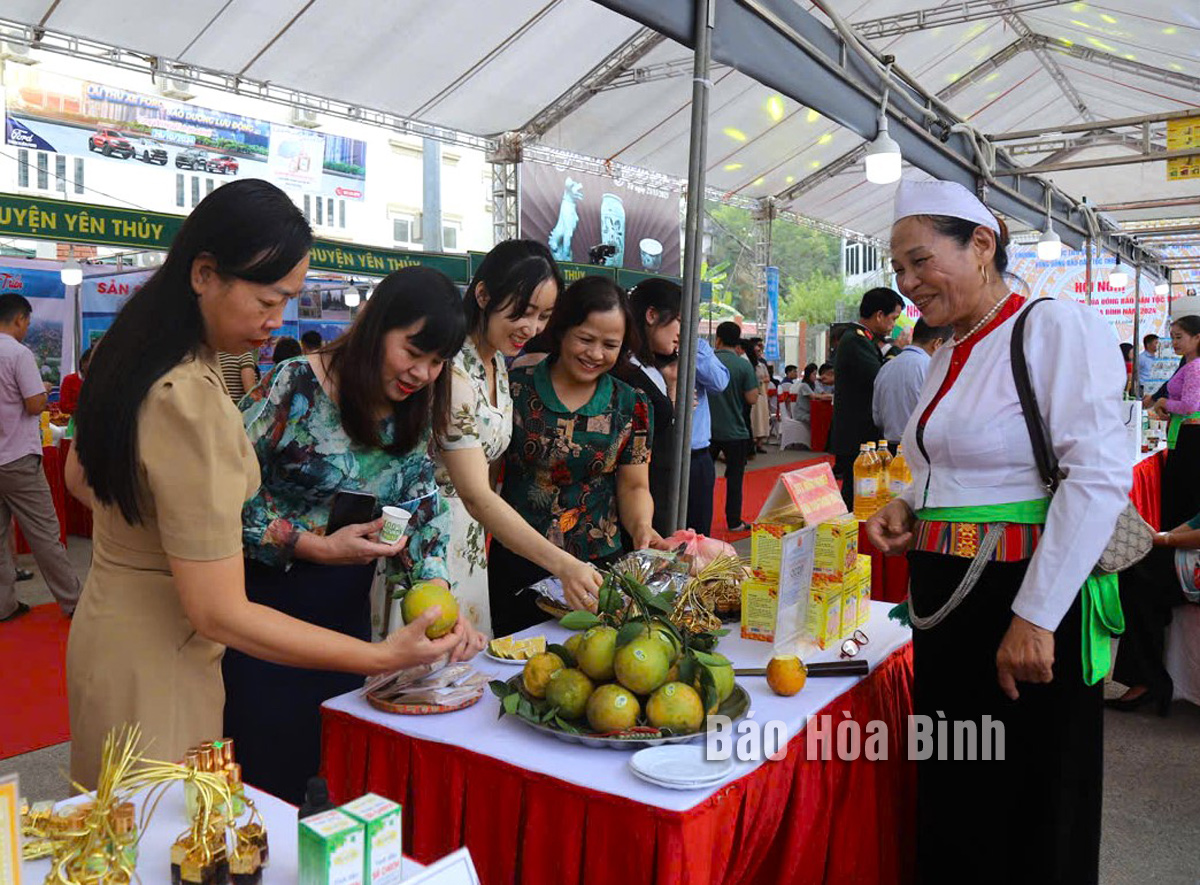
In recent years, Hoa Binh has allocated significant resources to foster cooperative economy, helping ethnic minorities capitalise on their potential and advantages to escape poverty.
Farm produce from Ban Dao Thong Nhat Cooperative in Hoa Binh city attracts considerable public interest at an event promoting ethnic minority and mountainous region products held in November.
An example of the effort has been shown in Tan Lac district’s Quyet Chien commune – a particularly challenging area, with the Muong ethnic minority group making up 99.9% of its population.
In 2008, the province’s centre for applied scientific techniques supported local residents in a trial planting of chayote vines for leaf on 0.5 hectares. In April 2017, the Quyet Chien safe vegetable cooperative was established with 39 members. Then the cooperative has expanded, providing stable incomes for hundreds of member households, with profit now exceeding 400 million VND (15,721 USD) per hectare annually.
The provincial Cooperative Alliance has so far organised 11 vocational training courses for 330 learners from ethnic minority and mountainous regions in fields such as industrial sewing, brocade weaving, and pig farming techniques; and 5 skills training classes on e-commerce, product storytelling, and marketing skills for 131 learners. The alliance has also conducted surveys and developed value chain production plans for products like fresh sugarcane and purple sweet potatoes across districts like Luong Son, Tan Lac, Lac Son, Yen Thuy, and Mai Chau. In addition, nine start-up projects for cooperatives in particularly challenging areas have been implemented.
According to Ha Ngoc Tuan, Chairman of the alliance, these activities have spurred the establishment of cooperatives and collaborative groups within ethnic communities, creating jobs and increasing incomes serving their socio-economic development and poverty alleviation.
As per the alliance’s data, ethnic minorities play management roles in over 320 cooperatives and operate more than 100 collaborative groups.
Hoa Binh province is undergoing a dynamic transformation amid Vietnam’s national digital transition. Building on Poliburo’s Resolution No. 57-NQ/TW on breakthroughs in science, technology, innovation, and national digital transformation, the province has rolled out a wide range of practical action plans. A standout initiative is the "Digital Literacy for All” movement, an effort to ensure that no one is left behind in the digital era.
Hoa Binh province is undergoing a dynamic transformation in the wake of the national digital transformation movement. Building on Resolution No. 57-NQ/TW of the Politburo on breakthroughs in science, technology, innovation, and national digital transformation, the province has implemented a wide range of practical action plans. A standout initiative is the "Digital Literacy for All” movement ambitious effort to ensure that no one is left behind in the digital age.
With a spirit of unity and proactive problem-solving, the Party Committee, the government and the people of Dong Lai Commune (Tan Lac District) have made great strides in implementing the resolutions of the 24th Party Congress of the commune for the 2020 - 2025 term. Focusing on leadership and practical actions, the commune has brought the Party’s resolutions into daily life, creating strong impacts and pushing the local development forward.
Amid the nationwide push for digital transformation, young people in Hoa Binh Province are stepping up as dynamic pioneers, applying technology to enhance Youth Union operations and expand the reach of youth-led initiatives. Through creativity and adaptability, Youth Union organizations at all levels have introduced a series of practical solutions, contributing to modern governance and community development.
In recent years, An Nghia commune, located in Lac Son district, has stepped up administrative reform, focusing on improving the quality and efficiency of its single-window service unit for receiving and processing administrative procedures. These improvements have helped create favourable conditions for local residents and organisations to handle administrative procedures, contributing to the commune’s broader socio-economic development.
The Prime Minister-approved master plan to develop the multi-use value of forests ecosystems through 2030, with a vision to 2050, aims to improve the management and sustainable use of forest resources, create jobs, increase incomes, and improve the living standards of ethnic minorities, people in mountainous and remote areas, forest workers and those living near forests.



